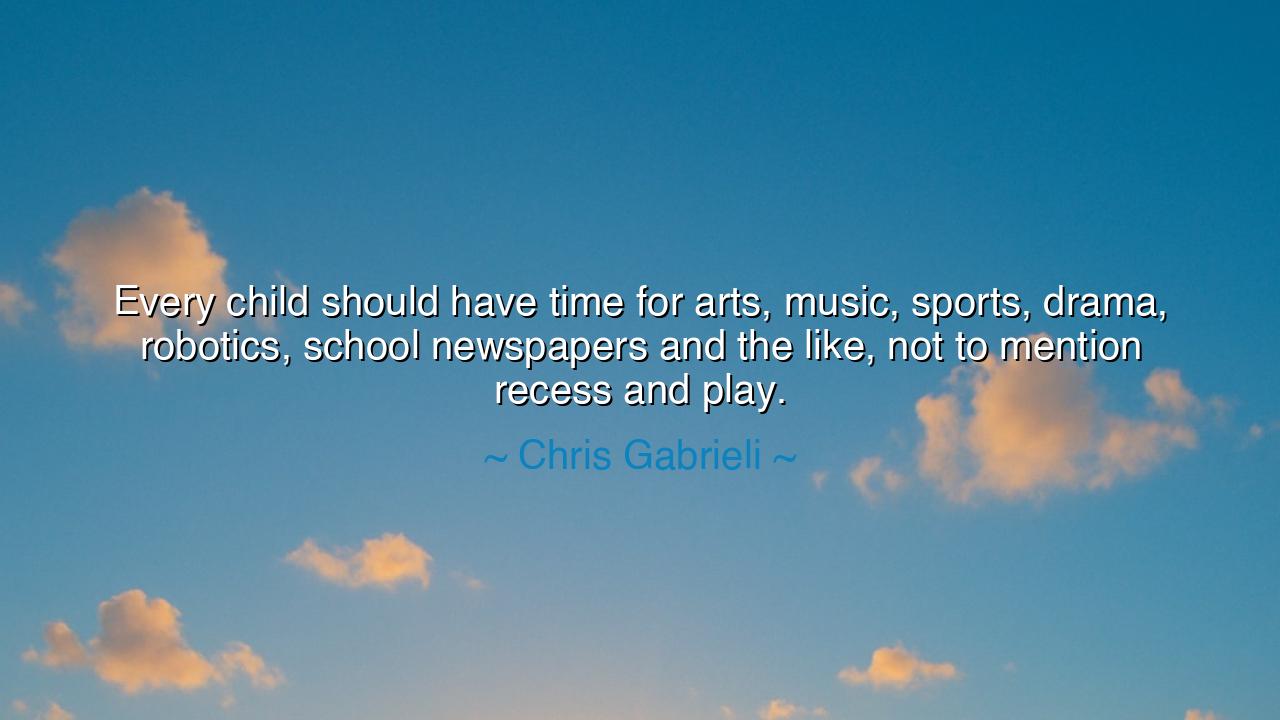
Every child should have time for arts, music, sports, drama
Every child should have time for arts, music, sports, drama, robotics, school newspapers and the like, not to mention recess and play.






Chris Gabrieli, an advocate for education and the fullness of human development, once declared: “Every child should have time for arts, music, sports, drama, robotics, school newspapers and the like, not to mention recess and play.” His words are not simply about school schedules or extracurriculars; they are about the very shape of the human soul. For Gabrieli reminds us that children are not vessels to be filled only with numbers and facts, but gardens to be nourished with creativity, discipline, imagination, and joy.
The arts awaken the spirit, teaching the child to see beauty in form and color, to express that which words cannot capture. Music stirs the heart, binding discipline with freedom, harmony with passion. Sports teach the body strength and the mind resilience, binding individuals into teams and awakening the fire of competition. Drama opens the door to empathy, allowing one to step into the lives of others, to feel what others feel. Even robotics and school newspapers are not trivial diversions but the training grounds of invention and truth-seeking, preparing young minds to craft the tools and stories of tomorrow.
Gabrieli’s wisdom is not new; it echoes the vision of the ancients. In Greece, the education of the youth was not limited to philosophy or mathematics alone. The paideia, the system of cultivation, included music, athletics, literature, and art, for the Greeks believed that the well-formed citizen must be balanced in body, mind, and spirit. So too in Renaissance Italy, the ideal of the “Renaissance man” was born—a being who painted, studied, fenced, sang, and wrote, for all knowledge and skill were seen as threads of the same tapestry. Gabrieli’s words remind us of this older truth, urging us not to starve the child of variety, but to feed them with abundance.
History itself proves the fruits of such breadth. Consider Leonardo da Vinci, who was at once artist, inventor, anatomist, musician, and engineer. Had his childhood been bound to one narrow study, the world would never have known the Mona Lisa, the flying machine, or the studies of the human heart. Consider also the story of Nelson Mandela, who found freedom and dignity not only in political struggle but also in boxing, which gave him discipline and resilience. A well-rounded education does not merely produce workers—it produces humans capable of greatness.
Yet too often in our time, children are burdened with relentless academic pressure, stripped of time to play, to imagine, to experiment. Gabrieli’s words strike as both hope and warning: hope, that we can still craft schools that honor the fullness of the child; warning, that if we do not, we risk raising generations who can calculate and memorize, but who cannot create, empathize, or dream. For what is the profit in producing clever minds if the heart remains unfed?
The lesson for us is profound: defend time for the arts, for music, for sports, for joy. Do not see them as luxuries, but as necessities of the spirit. A child who paints may also become a scientist with vision; a child who plays may also become a leader who knows the value of laughter. These pursuits are not distractions from education—they are education, the shaping of the whole person.
Therefore, let us carry Gabrieli’s words as law: every child should have time—time to explore, time to create, time to play. Parents, protect it. Teachers, nurture it. Leaders, defend it. For in giving children breadth, we give them depth; in giving them freedom, we give them strength. And when they grow, they will not only solve the problems of their age, but also carry the beauty, the wisdom, and the humanity to make life worth living.
For in the end, a society that deprives its children of arts, music, sports, drama, play is a society that deprives itself of its future. But one that nourishes them in all these things plants seeds of greatness, and from those seeds will grow a generation capable of both wisdom and wonder.






AAdministratorAdministrator
Welcome, honored guests. Please leave a comment, we will respond soon